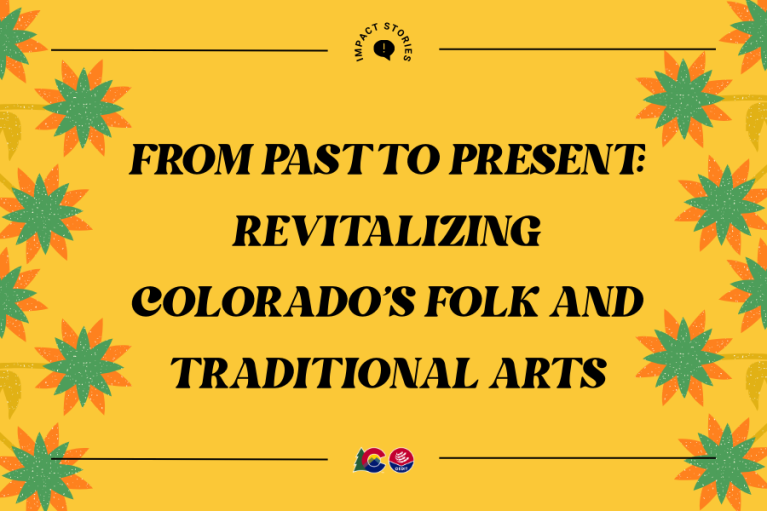Colorado’s rich history is composed of a diverse mix of communities that share their distinct culture and experiences through their trades, talents, and various artistic mediums. Recognized as Folk and Traditional Arts, this broad category of creative activities serves as a way to pass on to each generation the traditions and stories of the past. As the United States nears its 250th anniversary and Colorado celebrates its 150th in 2026, preserving and archiving these creative works offers one way to honor and commemorate the state's formative years.
By supporting the preservation, teaching, and creation of this form of artistic expression, Colorado’s unique heritage persists while strengthening the creative industries that fuel local economies. Since 2024, the Folk and Traditional Arts Project Grant, run by OEDIT’s Colorado Creative Industries (CCI) division, has supported over 70 projects including dance performances, tailoring, sculpture, photography, culinary arts, and more. Given the incredible variety of Folk and Traditional arts, let’s take a glimpse into three grant-supported projects and how they help preserve a community's cultural heritage.
Four Corners Indigenous Art Market in Montezuma County
The Four Corners Indigenous Art Market, hosted by the Canyons of the Ancients Visitor Center & Museum in Dolores, Colorado, serves as a vital platform for the preservation and celebration of Indigenous folk and traditional arts. This project directly supports cultural preservation by providing Indigenous artists with stipends and a space to showcase and sell their work—fostering economic empowerment within the community.
"The Folk and Traditional Arts grant has been a huge help in growing the Four Corners Indigenous Art Market. Most importantly, it’s helped strengthen connections between artists and the community, creating a space to celebrate and honor Indigenous traditions," said Markleigh Swanson, Executive Director of the Southwest Colorado Canyons Alliance.
The Four Corners Indigenous Art Market also showcases cultural demonstrations and performances, cultivating a deeper appreciation for Indigenous art and elevating community pride. Events like this gathering ensure traditional knowledge and artistic practices are shared, honored, and sustained for future generations.
Learning Colcha Embroidery in the San Luis Valley
At the Saguache County Museum, a free, at-capacity event gave Saguache County residents the opportunity to dive into the rich history of colcha embroidery in the San Luis Valley. Colcha embroidery from the southwest U.S. is a form of surface embroidery that uses wool threads on cotton or linen fabric. Attendees learned the traditional colcha stitch, and explored related artwork and publications. This collaborative initiative, involving HEART of Saguache, The Range, and local artists, brought the community together as they celebrated their county’s history.
Experienced instructors from San Luis and Monte Vista, including Maria Eufemia Barela, Donna Madrid Hernandez, Aurora Martinez, and Julia Mondragon, led the workshop. Local colcha embroidery experts Patsy Garcia and Delores Worley, who were part of the original La Costura de Saguache group from the 1970s, also assisted, ensuring the continuation of this vital artistic tradition.
Appreciating Handmade Leather Goods in the Rocky Mountains
In the Grand Lake Creative District, the Rocky Mountain Folk School hosted an "Intro to Cowboy Boot Making" class, led by the renowned Jim Brainard of J.B. Custom Leather, with the help of his son, T.J. Brainard. Participants learned the fundamentals and gained a better understanding of the leather, its texture, flexibility, and the importance of precision in every cut and stitch. The workshop emphasized the importance of preserving this increasingly rare craft that embodies the spirit of the West in a world dominated by mass production.
“This was the first of many leatherworking workshops to come, and it wouldn’t have been possible without support from Colorado Creative Industries. The grant allowed us to bring in a legendary bootmaker and keep the class affordable for our community,” said Gillian Horne, Executive Director of the Rocky Mountain Folk School.
Support from the Folk and Traditional Arts Project Grant enabled access to top-quality materials and tools, providing an enriching learning experience for attendees. The event covered the significance of hands-on learning and the community’s role in sustaining these crafts for future generations. Participants left with new skills and a profound appreciation for the artistry and dedication required to create handmade leather goods.
The state of Colorado and CCI are deeply committed to fostering creativity and preserving traditional arts, ensuring that these rich cultural heritages thrive for the years to come. Through initiatives like the Folk and Traditional Arts Project Grant, CCI actively enhances community well-being by fostering belonging, cultural identity, economic vitality, and a strong sense of place.
As Libby Barbee, Senior Program Manager at CCI, states, "The Folk and Traditional Arts Project Grant allows CCI to invest in the artists and culture-bearers who preserve and promote Colorado's vibrant and diverse traditions and history. Their creations serve as the ties that bind our communities and define Colorado's unique identity."
To learn more about this valuable program, visit CCI's grant page.
